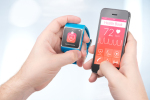Apple Watch, the newest diagnostic tool in the battle against chronic diseases?
May 01, 2015
by John W. Mitchell, Senior Correspondent
Ochsner Health System in New Orleans is unveiling a pilot program that utilizes the Apple Watch for managing and improving population health. According to Dr. Richard Milani, Ochsner's chief clinical transformation officer, the much-anticipated wearable device could be a powerful tool in the management of chronic conditions.
“Chronic disease — such as hypertension, which places patients at risk for stroke or kidney failure — is the cause of seven out of 10 deaths and 80 percent of health care costs,” said Milani. “Ochsner is very interested in ways that technology can empower patients to modify their behavior in a positive way to help manage their chronic conditions."
Dr. Milani notes that while he and his colleagues have no personal interest in promoting Apple's new wearable device, the watch has two features that he thinks could drastically improve care for chronic disease patients.
“About 50 percent of patients don’t take their medications on time or forget to take their medications,” he explained. “The watch can be programmed with an actual image of the pill — say an oblong purple pill with yellow stripes — so the patient knows what it looks like if they are on several medications.”
The second feature is a detailed, but simple, activity tracking function. Milani said it allows patients to see at a glance how much of their daily exercise goal they have met, their activity level, and the amount of time they have spent standing.
Ochsner reported this is the first such clinical study use-case of the Apple Watch in the country, and their goal is to recruit 100 patients as part of the just-launched pilot program. Patients are recruited from its existing Hypertension Digital Medicine Program, which has about 50 members.
These patients participate within Ochsner's O Bar Interactive Health Technology program, which deploys wearable technology, smartphone applications and other devices to help patients manage their chronic conditions remotely — rather than requiring doctor appointments.
“Traditionally the U.S. health care system has not done a great job of helping chronic disease patients manage their condition,” said Milani. “Only half of patients with chronic high blood pressure get it under control. We think wearable devices are a great opportunity to positively change behavior.”
“Chronic disease — such as hypertension, which places patients at risk for stroke or kidney failure — is the cause of seven out of 10 deaths and 80 percent of health care costs,” said Milani. “Ochsner is very interested in ways that technology can empower patients to modify their behavior in a positive way to help manage their chronic conditions."
Dr. Milani notes that while he and his colleagues have no personal interest in promoting Apple's new wearable device, the watch has two features that he thinks could drastically improve care for chronic disease patients.
“About 50 percent of patients don’t take their medications on time or forget to take their medications,” he explained. “The watch can be programmed with an actual image of the pill — say an oblong purple pill with yellow stripes — so the patient knows what it looks like if they are on several medications.”
The second feature is a detailed, but simple, activity tracking function. Milani said it allows patients to see at a glance how much of their daily exercise goal they have met, their activity level, and the amount of time they have spent standing.
Ochsner reported this is the first such clinical study use-case of the Apple Watch in the country, and their goal is to recruit 100 patients as part of the just-launched pilot program. Patients are recruited from its existing Hypertension Digital Medicine Program, which has about 50 members.
These patients participate within Ochsner's O Bar Interactive Health Technology program, which deploys wearable technology, smartphone applications and other devices to help patients manage their chronic conditions remotely — rather than requiring doctor appointments.
“Traditionally the U.S. health care system has not done a great job of helping chronic disease patients manage their condition,” said Milani. “Only half of patients with chronic high blood pressure get it under control. We think wearable devices are a great opportunity to positively change behavior.”
